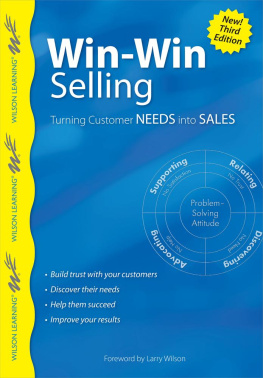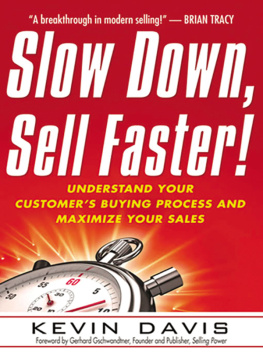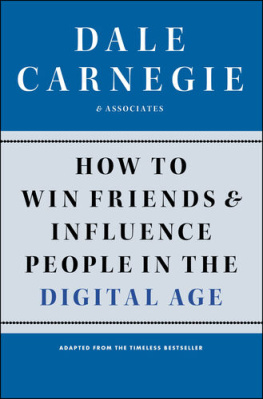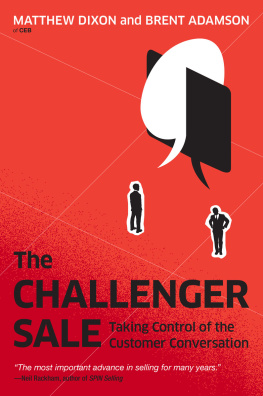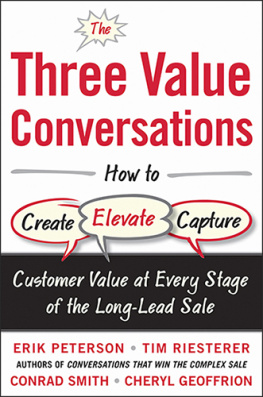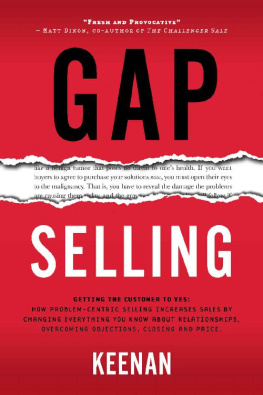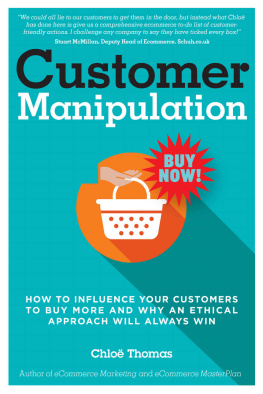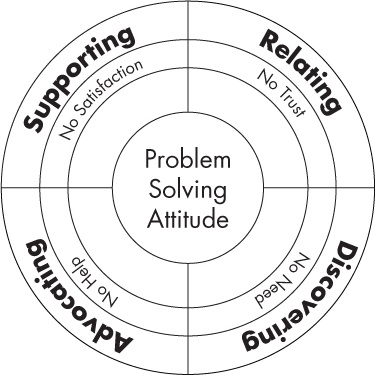Foreword
The publication of this book is a fulfilling moment for me, since it extends the benefits of the Counselor selling approach to many readers. It also takes me back to my earliest days in sales, in the Fifties. I was earning $200 and spending $210 each month, teaching high school. My uncle recruited me into the life insurance business, promising I would make $400 per month. I actually believed I would never have another financial challenge in my lifetime.
It wasnt easy at first. I was shocked that some people didnt want to talk to me as a life insurance agent. I started reading Victor Frankels book, Mans Search for Meaning . It helped me weather the emotional slings and arrows of outrageous rejection. Frankels message about the final freedom that everyone experiences when faced with any adversity encouraged me as if he were whispering right into my psyche.
For my seven years in the business I stayed at the top of my companys sales success chart and became the Youngest Lifetime Member of the Million Dollar Roundtable. That honor led to invitations to speak at meetings and share my selling secrets. I accepted them, even though I couldnt articulate what my secrets actually were. So I borrowed other peoples secrets and spoke articulately as though they were mine.
Then the unexpected happened. A client company to whom I had presented my secrets-of-somebody-elses-success speech asked if I would create a training program for them. My immediate, fearful thought was, I dont know how to do that, but nonetheless, I said yes. Then it occurred to me. Until the Sixties, selling was seen as an adversarial relationship the seller beats the buyer in a win-lose scenario. You heard about 110 ways to close a sale, 88 ways to answer an objection. This clearly wasnt the basis of my success. So I went looking for my own secrets. I lucked out when I paid $1.00 for a psychology book. The only part I read was by Brandice Universitys head of psychology, Abraham Maslow, defining his pyramid of needs. I had never heard of him, even though he pioneered in humanistic psychology.
I soon met with Dr. Maslow because I knew his concepts had something to do with my humanistic view of selling. It was a defining moment. Maslow guided me to Dr. Carl Rogers, a well-known therapist, who authored On Becoming a Person and Client-Centered Therapy . These books, combined with Maslows humanistic perspective, became the soil in which the Counselor concept began to germinate and provide the harvest for an entirely new mindset on selling.
Dr. Rogers helped me understand the model of counseling, which is an integrated philosophy, discipline, and set of skills. These help the client solve problems, find advantages, and reap the benefits of new solutions. Applied to selling, the Counselor salesperson benefits by creating a win-win relationship and a loyal customer.
Helping people get what they want and feel the way they want to feel was what I couldnt express earlier. Essentially the model says, The more I help others get what they want, the more I get what I want. This new model felt right, and helped me discover and become more of my true self the person I was when I was at my best.
I dont know how many millions of people have been through the Counselor Salesperson program offered by Wilson Learning since 1965. But I do know that those who have absorbed its full message have discovered the power of its secrets not only in their work lives, but more importantly, in all aspects of their lives. In learning to counsel with their clients, they also learn to counsel within their most important relationships with family, friends, themselves.
I started Wilson Learning with a purpose statement that was inspired by Dr. Maslow helping others become as much as they can be. I hope, as you read this book, you can combine your life purpose with these powerful competencies. Counsel yourself to become as much as you can be, while counseling your clients to become as much as they can be. Youll both enjoy the ultimate win-win. I wish you all the best.
Larry Wilson
The Counselor Mindset
4 Supporting completes the cycle, ensuring customers experience the benefits of solutions and see needs met. Reinforces your Counselor role in the implementation; reveals the next problems to solve together. Avoids dissatisfaction; gives you a sustainable advantage.
1 Relating creates an open, trusting relationship with your customers and enhances your credibility. Lays the groundwork for genuine problem solving. Demonstrates good intent. Avoids problems stemming from customers initial tension about your intent and ability to help.
3 Advocating links the outcomes of Discovery to your offering and engages your customers as partners. Involves customers as internal supporters of your jointly developed solution. Avoids customers sense that the offer gives no help for their situation.
2 Discovering engages the customers in candidly sharing information so you can together define their needs and problems, the very ones which create the Gap that prevents them from getting to their desired states. Avoids the common perception theres no need to buy.
The Counselor method combines win-win, problem solving attitudes with people skills, in a four-stage cycle. But the whole the Counselor mindset and the Counselor selling skills is really greater than the sum of its parts.
Chapter 1. Loving Your Job: the Counselor Mindset
Picture this: you love your job in sales, and you are really good at it. You get up each morning excited about the joys and challenges of the day. You know you are doing something that helps other people and makes them feel good about themselves. You solve problems and make things better. Your customers welcome you warmly. Youre a successful salesperson, and you feel great.
Unfortunately, that picture doesnt describe every salesperson today. And if you look for books to help you sell better, you find that most people do not believe that salespeople can or should feel good about themselves. Titles like Guerilla Selling or How to Sell Anything to Anyone create the wrong impression about successful salespeople. How can you feel good about your job day after day if your primary goal is to pull a sale out of your customers pocket?
At Wilson Learning Worldwide we reject that approach to selling. We believe, and our research shows, that the most successful salespeople gain happiness and fulfillment from being a different kind of salesperson. They reach fulfillment by seeing selling as a way to help customers get what they truly need and want. This philosophy fundamentally changes what happens between the salesperson and the customer. You, the seller, become a counselor for your customer. That is why we call it the Counselor Approach.
With this book, you can master the practical, proven skills of the Counselor Approach and adopt the Counselor Mindset. When you do, you will sell well and feel good about it. At Wilson Learning, we call this Performance with Fulfillment . It is a powerful tool, not an impossible dream.

